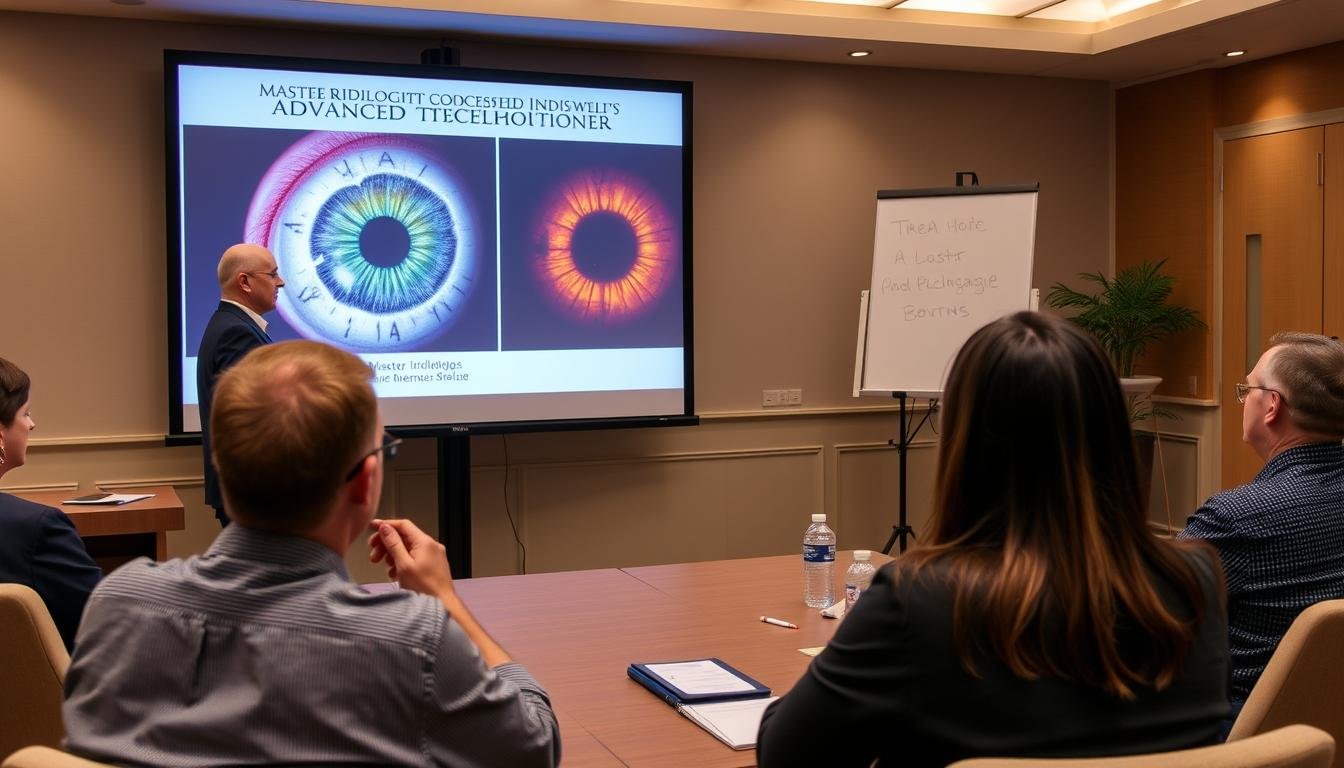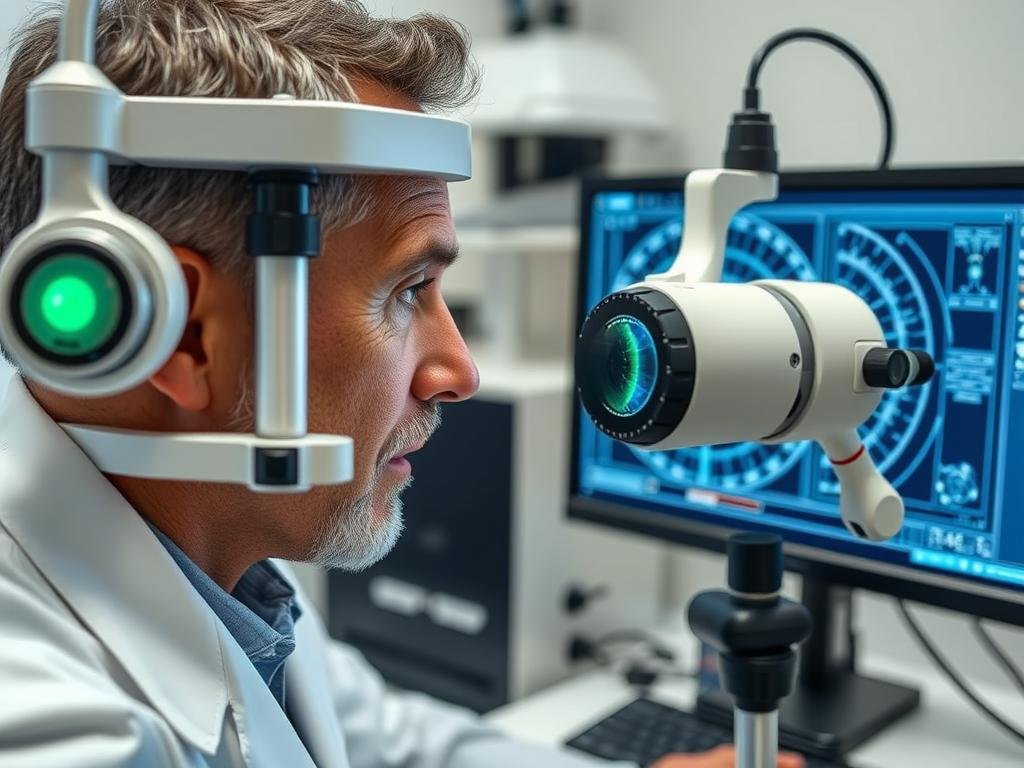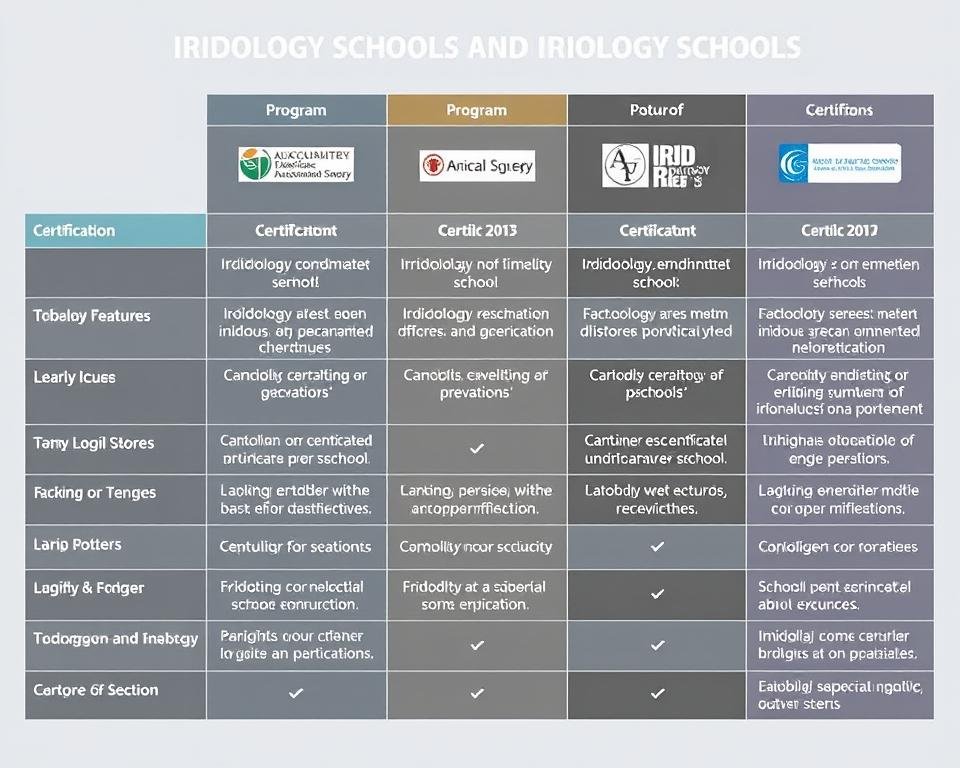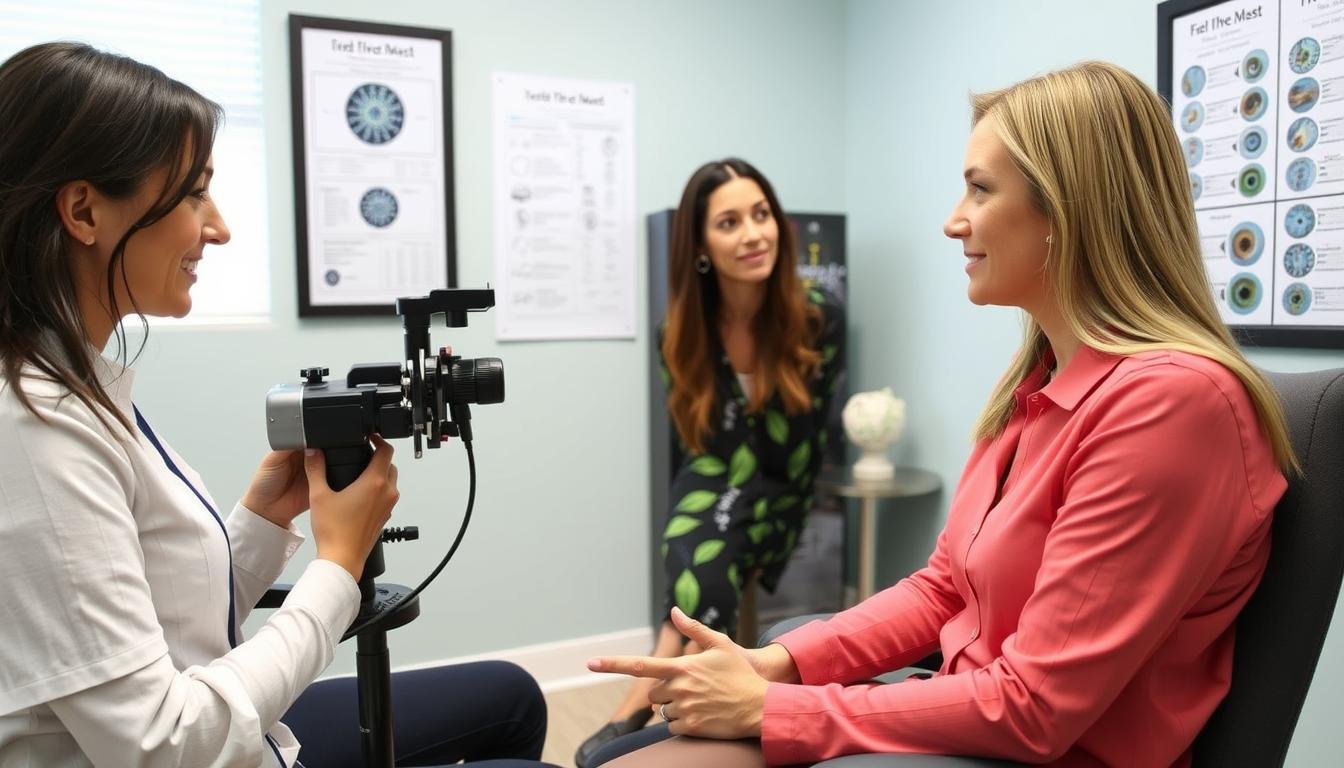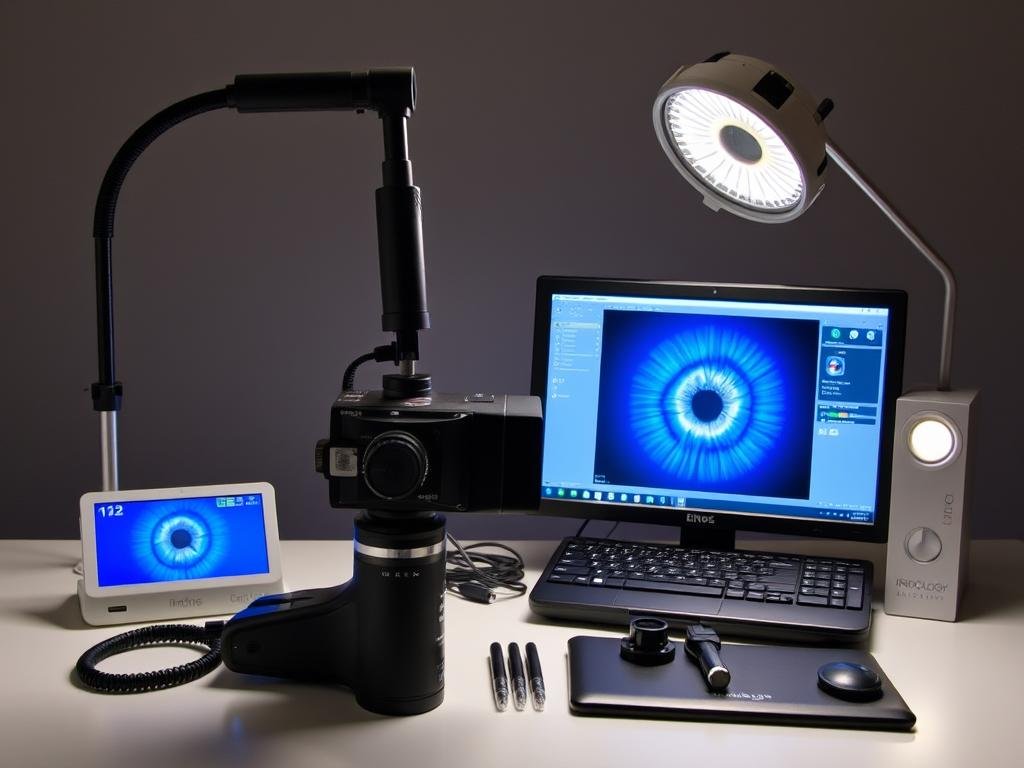The fascinating field of iridology—analyzing the iris to assess health conditions—offers various certification pathways for practitioners seeking to master this diagnostic art. Whether you’re a healthcare professional looking to expand your skills or someone passionate about alternative health approaches, understanding the different levels of iridology certification is crucial for making informed decisions about your educational journey. This comprehensive guide breaks down each certification tier, helping you navigate the requirements, benefits, and career opportunities available at each level.
What Is Iridology Certification?
Iridology practitioners use specialized equipment to analyze iris patterns
An iridology certification is a professional credential that validates your knowledge and skills in analyzing the iris to identify potential health issues and constitutional strengths. These programs teach practitioners how to recognize various markings, colors, and patterns in the iris that correspond to different body systems and potential health conditions.
Certification programs typically cover iris anatomy, topography, constitutional analysis, and the practical application of iridology in clinical settings. Unlike many medical specialties, iridology is considered a complementary assessment tool rather than a diagnostic method for specific diseases.
Most reputable iridology certification programs are accredited by organizations such as the International Iridology Practitioners Association (IIPA), the Guild of Naturopathic Iridologists International (GNII), or the Association of Natural Health Practitioners (ANHP).
Why Pursue Iridology Certification?
Iridology offers practitioners a non-invasive assessment tool that can provide insights into a client’s constitutional strengths and weaknesses. By analyzing the iris, trained iridologists can identify areas of concern before they manifest as serious health issues, allowing for preventative approaches.
For health practitioners, adding iridology to your skillset can enhance your practice by providing another dimension of client assessment. Many naturopaths, nutritionists, herbalists, and holistic health coaches integrate iridology into their practice to create more personalized wellness plans.
Benefits of Certification
- Enhanced credibility with clients
- Non-invasive assessment tool
- Ability to identify constitutional patterns
- Complement to other holistic practices
- Potential for increased client base
Considerations
- Time investment for proper training
- Ongoing education requirements
- Not recognized by conventional medicine
- Varying regulatory requirements by region
Level 1: Basic Iridology Certification
Entry-level iridology certification programs provide a foundation in iris analysis and are ideal for those new to the field. These programs typically require no prior experience in healthcare and focus on building fundamental knowledge.
Basic Certification Core Components
- Anatomy and physiology of the eye and iris
- Basic iris topography and mapping
- Fundamental iris signs and markings
- Constitutional analysis basics
- Introduction to iris photography techniques
- Ethical considerations in practice
| Program Feature | Typical Requirements |
| Duration | 3-6 months (part-time) |
| Credit Hours | 10-15 credits |
| Prerequisites | High school diploma or equivalent |
| Format | Online, in-person, or hybrid |
| Average Cost | $700-$1,200 |
| Certification Title | Certified Iridologist (CI) |
Upon completion of a basic certification program, graduates can typically perform basic iris analysis but are encouraged to continue their education before establishing a full practice. Many use this level as a stepping stone to more advanced certifications.
Ready to Begin Your Iridology Journey?
Take the first step toward becoming a certified iridologist with our comprehensive basic certification program.
Request Program Information
Level 2: Advanced Iridology Certification
Advanced iridology certification builds upon the foundational knowledge gained in basic programs, offering deeper insights into iris analysis and its practical applications. These programs are designed for practitioners who have completed basic certification and wish to enhance their skills.
Advanced Program Curriculum
- Detailed constitutional analysis
- Advanced iris signs and their clinical significance
- Correlation between iris markings and specific health conditions
- Integration with other assessment methods
- Sclerology (analysis of the sclera or white of the eye)
- Client case management and follow-up protocols
- Advanced iris photography and documentation
Key Advancement Areas
Advanced certification programs typically emphasize practical application through case studies and supervised practice sessions. Students learn to integrate iridology with other modalities such as nutrition, herbology, and naturopathic approaches to create comprehensive wellness plans.
Many programs at this level also introduce specialized equipment and software for more precise iris analysis and documentation.
| Program Feature | Typical Requirements |
| Duration | 6-12 months |
| Credit Hours | 25-40 credits |
| Prerequisites | Basic iridology certification or equivalent |
| Format | Combined online and in-person clinical practice |
| Average Cost | $1,800-$2,500 |
| Certification Title | Certified Iridology Practitioner (CIP) or Advanced Certified Iridologist (ACI) |
Graduates of advanced certification programs can typically establish independent iridology practices or integrate these skills into existing health practices. Many practitioners at this level work alongside other healthcare providers in integrative wellness centers.
Level 3: Master Iridology Certification
Master-level iridology certification represents the highest tier of formal education in this field. These comprehensive programs are designed for serious practitioners who aim to become experts, educators, or researchers in iridology.
Specialized Tracks in Master Programs
Clinical Practice Track
Focuses on advanced clinical applications, complex case management, and integration with other diagnostic modalities. Ideal for practitioners planning to work in clinical settings.
Research Track
Emphasizes research methodologies, data collection, and analysis to contribute to the scientific understanding of iridology. Suitable for those interested in advancing the field through evidence-based research.
Education Track
Prepares graduates to teach iridology at various levels. Includes curriculum development, teaching methodologies, and mentorship skills. Perfect for those who wish to train the next generation of iridologists.
| Program Feature | Typical Requirements |
| Duration | 1-2 years |
| Credit Hours | 40-60 credits |
| Prerequisites | Advanced iridology certification plus 1-2 years of practice experience |
| Format | Hybrid with significant in-person clinical requirements |
| Average Cost | $3,000-$5,000 |
| Certification Title | Master Iridologist (MI) or Registered Integrative Iridologist Practitioner (RIIP) |
Master-level certification often includes a capstone project, thesis, or extensive case portfolio demonstrating the practitioner’s expertise. Many programs also require students to complete a certain number of supervised clinical hours and document successful client outcomes.
Become a Master in the Field of Iridology
Join our elite master certification program and position yourself as a leader in iridology practice and education.
Schedule a Consultation
How to Choose the Right Iridology Certification Program
Selecting the appropriate iridology certification program is crucial for your professional development. Consider these key factors when evaluating potential programs:
Essential Evaluation Criteria
- Accreditation: Verify that the program is recognized by reputable organizations like IIPA, GNII, or ANHP.
- Instructor Credentials: Research the qualifications and experience of the teaching faculty.
- Curriculum Comprehensiveness: Ensure the program covers both theoretical knowledge and practical applications.
- Learning Format: Consider whether online, in-person, or hybrid learning best suits your needs.
- Clinical Experience: Check if the program includes supervised practice with real clients.
- Graduate Success: Look for testimonials or success stories from program alumni.
- Support Resources: Evaluate the availability of learning materials, mentorship, and post-graduation support.
“The quality of your iridology education directly impacts your effectiveness as a practitioner. Choose a program that not only teaches techniques but also emphasizes ethical practice and continuous learning.”
– Peter Jackson-Main, Master Iridologist and Educator
Questions to Ask Before Enrolling
- How long has the school been teaching iridology?
- What percentage of graduates successfully establish practices?
- Is there a community of graduates for ongoing support?
- Does the program teach traditional methods, modern approaches, or both?
- Are there opportunities for continuing education?

Need Help Finding Your Perfect Program?
Our educational advisors can help you navigate the options and find the right certification path for your goals.
Schedule a Free Consultation
Career Paths with Iridology Certification
An iridology certification opens doors to various career opportunities in the holistic health field. Depending on your certification level and additional qualifications, you might pursue any of the following paths:
Private Practice
Establish your own iridology practice, offering assessments and wellness recommendations. Many successful iridologists combine their practice with other complementary modalities like nutrition counseling or herbalism.
Average Income: $45,000-$75,000
Integrative Health Centers
Join multidisciplinary wellness centers where you can collaborate with other health practitioners such as naturopaths, acupuncturists, and massage therapists to provide comprehensive care.
Average Income: $50,000-$80,000
Education & Training
Teach iridology at schools, lead workshops, or develop training materials. Master-level iridologists often find fulfilling careers sharing their knowledge with the next generation of practitioners.
Average Income: $60,000-$90,000
Emerging Opportunities in Iridology
- Digital Health Platforms: Some iridologists now offer virtual consultations and assessments through telehealth platforms.
- Corporate Wellness Programs: Providing iris assessments as part of employee wellness initiatives.
- Research Participation: Contributing to studies that explore the efficacy and applications of iridology.
- Product Development: Consulting for companies developing iris analysis software or equipment.
- Writing & Publishing: Authoring books, articles, or online content about iridology and holistic health.
Frequently Asked Questions About Iridology Certification
Is iridology certification recognized globally?
While iridology is practiced worldwide, recognition varies by country. Major international organizations like the International Iridology Practitioners Association (IIPA) provide standards that are respected in many countries. However, legal recognition as a healthcare practice varies significantly by region. It’s important to research the regulations in your specific location before establishing a practice.
How long does it take to complete an iridology certification program?
Program duration varies by level and format. Basic certification typically takes 3-6 months of part-time study. Advanced certification usually requires 6-12 months, while master-level programs may take 1-2 years to complete. Many programs offer flexible scheduling options to accommodate working professionals.
Do I need a background in healthcare to pursue iridology certification?
Most basic certification programs don’t require prior healthcare experience, though a background in anatomy and physiology is beneficial. Advanced and master-level programs often have prerequisites that may include basic certification or relevant healthcare experience. Some schools offer introductory anatomy courses for those without a healthcare background.
What equipment do I need to practice iridology?
At minimum, practitioners need a good quality iris camera or digital camera with macro capabilities, proper lighting, and reference materials like iris charts. More advanced practitioners often invest in specialized iris photography equipment and analysis software. Most certification programs will advise on essential equipment and may offer student discounts through preferred vendors.
Embarking on Your Iridology Certification Journey
Pursuing iridology certification can be a rewarding path for those passionate about holistic health assessment. By understanding the different certification levels and carefully evaluating program options, you can choose the educational path that best aligns with your career goals and interests.
Remember that certification is just the beginning of your journey. The most successful iridologists commit to lifelong learning, staying current with research developments, and continuously refining their skills through practice and professional development.
Whether you’re drawn to iridology as a complementary skill for your existing practice or as a primary career focus, the knowledge and insights gained through quality certification programs can enhance your ability to support clients on their wellness journeys.
Ready to Start Your Iridology Education?
Download our comprehensive guide to iridology certification programs and take the first step toward becoming a certified practitioner.
Download Free Certification Guide




